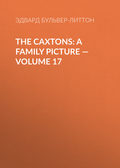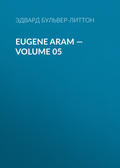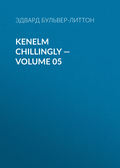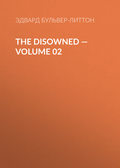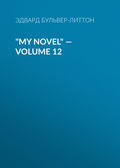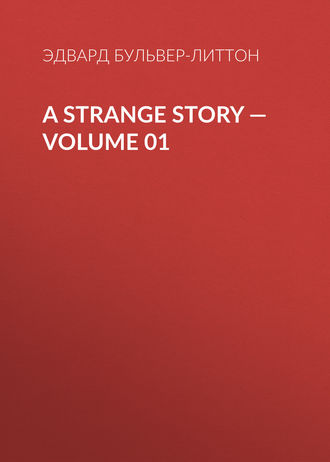
Эдвард Бульвер-Литтон
A Strange Story — Volume 01
CHAPTER XII
But suddenly I remembered Mrs. Poyntz. I ought to call on her. So I closed my round of visits at her door. The day was then far advanced, and the servant politely informed me that Mrs. Poyntz was at dinner. I could only leave my card, with a message that I would pay my respects to her the next day. That evening I received from her this note:—
Dear Dr. Fenwick,—I regret much that I cannot have the pleasure of seeing you to-morrow. Poyntz and I are going to visit his brother, at the other end of the county, and we start early. We shall be away some days. Sorry to hear from Mrs. Ashleigh that she has been persuaded by Mr. Vigors to consult Dr. Jones about Lilian. Vigors and Jones both frighten the poor mother, and insist upon consumptive tendencies. Unluckily, you seem to have said there was little the matter. Some doctors train their practice as some preachers fill their churches,—by adroit use of the appeals to terror. You do not want patients, Dr. Jones does. And, after all, better perhaps as it is. Yours, etc. M. Poyntz.
To my more selfish grief, anxiety for Lilian was now added. I had seen many more patients die from being mistreated for consumption than from consumption itself. And Dr. Jones was a mercenary, cunning, needy man, with much crafty knowledge of human foibles, but very little skill in the treatment of human maladies. My fears were soon confirmed. A few days after I heard from Miss Brabazon that Miss Ashleigh was seriously ill, kept her room. Mrs. Ashleigh made this excuse for not immediately returning the visits which the Hill had showered upon her. Miss Brabazon had seen Dr. Jones, who had shaken his head, said it was a serious case; but that time and care (his time and his care!) might effect wonders.
How stealthily at the dead of the night I would climb the Hill and look towards the windows of the old sombre house,—one window, in which a light burned dim and mournful, the light of a sick-room,—of hers!
At length Mrs. Poyntz came back, and I entered her house, having fully resolved beforehand on the line of policy to be adopted towards the potentate whom I hoped to secure as an ally. It was clear that neither disguise nor half-confidence would baffle the penetration of so keen an intellect, nor propitiate the good will of so imperious and resolute a temper. Perfect frankness here was the wisest prudence; and after all, it was most agreeable to my own nature, and most worthy of my own honour.
Luckily, I found Mrs. Poyntz alone, and taking in both mine the hand she somewhat coldly extended to me, I said, with the earnestness of suppressed emotion,—
"You observed when I last saw you, that I had not yet asked you to be my friend. I ask it now. Listen to me with all the indulgence you can vouchsafe, and let me at least profit by your counsel if you refuse to give me your aid."
Rapidly, briefly, I went on to say how I had first seen Lilian, and how sudden, how strange to myself, had been the impression which that first sight of her had produced.
"You remarked the change that had come over me," said I; "you divined the cause before I divined it myself,—divined it as I sat there beside you, thinking that through you I might see, in the freedom of social intercourse, the face that was then haunting me. You know what has since passed. Miss Ashleigh is ill; her case is, I am convinced, wholly misunderstood. All other feelings are merged in one sense of anxiety,—of alarm. But it has become due to me, due to all, to incur the risk of your ridicule even more than of your reproof, by stating to you thus candidly, plainly, bluntly, the sentiment which renders alarm so poignant, and which, if scarcely admissible to the romance of some wild dreamy boy, may seem an unpardonable folly in a man of my years and my sober calling,—due to me, to you, to Mrs. Ashleigh, because still the dearest thing in life to me is honour. And if you, who know Mrs. Ashleigh so intimately, who must be more or less aware of her plans or wishes for her daughter's future,—if you believe that those plans or wishes lead to a lot far more ambitious than an alliance with me could offer to Miss Ashleigh, then aid Mr. Vigors in excluding me from the house; aid me in suppressing a presumptuous, visionary passion. I cannot enter that house without love and hope at my heart; and the threshold of that house I must not cross if such love and such hope would be a sin and a treachery in the eyes of its owner. I might restore Miss Ashleigh to health; her gratitude might—I cannot continue. This danger must not be to me nor to her, if her mother has views far above such a son-in-law. And I am the more bound to consider all this while it is yet time, because I heard you state that Miss Ashleigh had a fortune, was what would be here termed an heiress. And the full consciousness that whatever fame one in my profession may live to acquire, does not open those vistas of social power and grandeur which are opened by professions to my eyes less noble in themselves,—that full consciousness, I say, was forced upon me by certain words of your own. For the rest, you know my descent is sufficiently recognized as that amidst well-born gentry to have rendered me no mesalliance to families the most proud of their ancestry, if I had kept my hereditary estate and avoided the career that makes me useful to man. But I acknowledge that on entering a profession such as mine—entering any profession except that of arms or the senate—all leave their pedigree at its door, an erased or dead letter. All must come as equals, high-born or low-born, into that arena in which men ask aid from a man as he makes himself; to them his dead forefathers are idle dust. Therefore, to the advantage of birth I cease to have a claim. I am but a provincial physician, whose station would be the same had he been a cobbler's son. But gold retains its grand privilege in all ranks. He who has gold is removed from the suspicion that attaches to the greedy fortune-hunter. My private fortune, swelled by my savings, is sufficient to secure to any one I married a larger settlement than many a wealthy squire can make. I need no fortune with a wife; if she have one, it would be settled on herself. Pardon these vulgar details. Now, have I made myself understood?"
"Fully," answered the Queen of the Hill, who had listened to me quietly, watchfully, and without one interruption, "fully; and you have done well to confide in me with so generous an unreserve. But before I say further, let me ask, what would be your advice for Lilian, supposing that you ought not to attend her? You have no trust in Dr. Jones; neither have I. And Annie Ashleigh's note received to-day, begging me to call, justifies your alarm. Still you think there is no tendency to consumption?"
"Of that I am certain so far as my slight glimpse of a case that to me, however, seems a simple and not uncommon one, will permit. But in the alternative you put—that my own skill, whatever its worth, is forbidden—my earnest advice is that Mrs. Ashleigh should take her daughter at once to London, and consult there those great authorities to whom I cannot compare my own opinion or experience; and by their counsel abide."
Mrs. Poyntz shaded her eyes with her hand for a few moments, and seemed in deliberation with herself. Then she said, with her peculiar smile, half grave, half ironical,—
"In matters more ordinary you would have won me to your side long ago. That Mr. Vigors should have presumed to cancel my recommendation to a settler on the Hill was an act of rebellion, and involved the honour of my prerogative; but I suppressed my indignation at an affront so unusual, partly out of pique against yourself, but much more, I think, out of regard for you."
"I understand. You detected the secret of my heart; you knew that Mrs. Ashleigh would not wish to see her daughter the wife of a provincial physician."
"Am I sure, or are you sure, that the daughter herself would accept that fate; or if she accepted it, would not repent?"
"Do you not think me the vainest of men when I say this,—that I cannot believe I should be so enthralled by a feeling at war with my reason, unfavoured by anything I can detect in my habits of mind, or even by the dreams of a youth which exalted science and excluded love, unless I was intimately convinced that Miss Ashleigh's heart was free, that I could win, and that I could keep it! Ask me why I am convinced of this, and I can tell you no more why I think that she could love me than I can tell you why I love her!"
"I am of the world, worldly; but I am a woman, womanly,—though I may not care to be thought it. And, therefore, though what you say is, regarded in a worldly point of view, sheer nonsense, regarded in a womanly point of view, it is logically sound. But still you cannot know Lilian as I do. Your nature and hers are in strong contrast. I do not think she is a safe wife for you. The purest, the most innocent creature imaginable, certainly that, but always in the seventh heaven; and you in the seventh heaven just at this moment, but with an irresistible gravitation to the solid earth, which will have its way again when the honeymoon is over—I do not believe you two would harmonize by intercourse. I do not believe Lilian would sympathize with you, and I am sure you could not sympathize with her throughout the long dull course of this workday life. And, therefore, for your sake, as well as hers, I was not displeased to find that Dr. Jones had replaced you; and now, in return for your frankness, I say frankly, do not go again to that house. Conquer this sentiment, fancy, passion, whatever it be. And I will advise Mrs. Ashleigh to take Lilian to town. Shall it be so settled?"
I could not speak. I buried my face in my hands-misery, misery, desolation!
I know not how long I remained thus silent, perhaps many minutes. At length I felt a cold, firm, but not ungentle hand placed upon mine; and a clear, full, but not discouraging voice said to me,—
"Leave me to think well over this conversation, and to ponder well the value of all you have shown that you so deeply feel. The interests of life do not fill both scales of the balance. The heart, which does not always go in the same scale with the interests, still has its weight in the scale opposed to them. I have heard a few wise men say, as many a silly woman says, 'Better be unhappy with one we love, than be happy with one we love not.' Do you say that too?"
"With every thought of my brain, every beat of my pulse, I say it."
"After that answer, all my questionings cease. You shall hear from me to-morrow. By that time, I shall have seen Annie and Lilian. I shall have weighed both scales of the balance,—and the heart here, Allen Fenwick, seems very heavy. Go, now. I hear feet on the stairs, Poyntz bringing up some friendly gossiper; gossipers are spies."
I passed my hand over my eyes, tearless, but how tears would have relieved the anguish that burdened them! and, without a word, went down the stairs, meeting at the landing-place Colonel Poyntz and the old man whose pain my prescription had cured. The old man was whistling a merry tune, perhaps first learned on the playground. He broke from it to thank, almost to embrace me, as I slid by him. I seized his jocund blessing as a good omen, and carried it with me as I passed into the broad sunlight. Solitary—solitary! Should I be so evermore?



